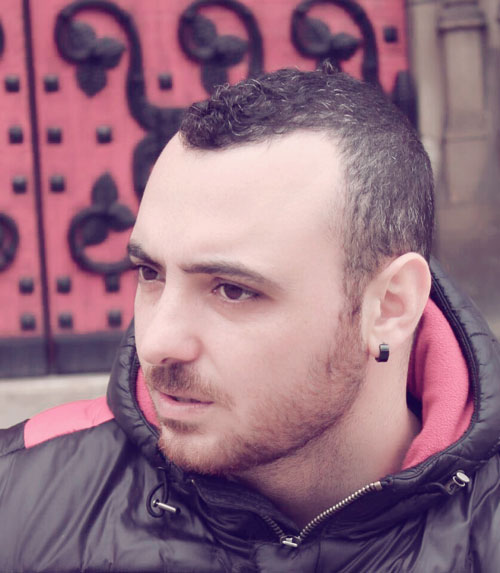Posted by Lucile Scott, January 29, 2015
 Johnny Tohme, a voluntary counseling and testing officer at the Marsa Sexual Health Center in Beirut, Lebanon, and executive director of the M-CoalitionIn mid-January, four GMT scholars from Belize, China, Pakistan, and South Africa arrived in Pittsburgh to begin five months of graduate-level public health study at the Center for LGBT Health Research of the Graduate School of Public Health at the University of Pittsburgh. This is the third year amfAR has supported the scholars program, which aims to strengthen GMT community-based research and responses to HIV by offering four researchers from low- and middle-income countries courses on LGBT health research, research methods, and grant writing. The scholarship also includes round-trip travel to the U.S., housing, and a modest stipend.
Johnny Tohme, a voluntary counseling and testing officer at the Marsa Sexual Health Center in Beirut, Lebanon, and executive director of the M-CoalitionIn mid-January, four GMT scholars from Belize, China, Pakistan, and South Africa arrived in Pittsburgh to begin five months of graduate-level public health study at the Center for LGBT Health Research of the Graduate School of Public Health at the University of Pittsburgh. This is the third year amfAR has supported the scholars program, which aims to strengthen GMT community-based research and responses to HIV by offering four researchers from low- and middle-income countries courses on LGBT health research, research methods, and grant writing. The scholarship also includes round-trip travel to the U.S., housing, and a modest stipend.
By the end of their stay, the scholars will have not only improved their research skills, but also drafted a proposal to investigate culturally appropriate strategies to improve HIV services for GMT individuals in their country. As this year’s classes got underway, the GMT Initiative checked in with a graduate from the inaugural 2013 class of amfAR HIV Scholars, Johnny Tohme, a voluntary counseling and testing officer at the Marsa Sexual Health Center in Beirut, Lebanon, and executive director of the M-Coalition, to see how his research was progressing.
amfAR: Why did you choose to focus your research on MSM (men who have sex with men) refugees in Lebanon?
Johnny: Populations destabilized by armed conflict are at an increased risk of HIV infection, and this vulnerability is compounded among MSM refugees due to their sexual orientation, especially in a context where religious and cultural conservatism contributes to high levels of stigma and discrimination. Currently, in Lebanon we have one-and-a-half million registered Syrian refugees —plus those who are not registered, a half million Palestinian refugees, and at least 30,000 Iraqi refugees—though some speculate the number is up to 100,000.
In 2012, I was involved in a U.S. National Institutes of Health-funded behavioral study among MSM in Beirut. Of our sample of 213 MSM, 35 were refugees. Data collected from these 35 participants was not sufficient to establish trends, but judging from our field observations, it seemed they were much less likely than their Lebanese counterparts to have been exposed to sexuality education or information about HIV. We were not aware of any published studies focusing on MSM refugees, so I proposed research to assess their level of HIV risk behavior and identify both barriers to and facilitators of risk reduction and healthy sexual behaviors.
amfAR: How is the study going?
We are done with the first stage of the study, a qualitative exploration of the factors that influence MSM refugees’ sexual risk behavior and their access to HIV testing and healthcare. The data was gathered through three focus groups. In mid-September 2014, we started quantitative data collection through a 40-minute survey. This data collection is expected to be finished by mid-June.
I can’t share any specific numbers until we are done with the data collection and analysis, but general observation has shown that refugees do indeed have a different perception on sexual health than their Lebanese counterparts, especially those who arrived in Lebanon recently. It also shows that the longer they are in the country, the more they connect with Lebanese MSM and adopt their behaviors.
amfAR: How did the HIV Scholars program impact your research?
The program was a stepping stone to a new career. It wasn’t just about research methodology, but also understanding the importance of research and the whole research process— how to move from an observation to a theory to the conception and application of a study to project implementation. Knowledge about this process is much needed in my field of work and in my country and region, and I was able to convey much of what I learned to my colleagues back home.
Since finishing the program, I also helped found the M-Coalition, the first and only regional HIV/AIDS advocacy network specifically devoted to the needs of MSM in the Arab world. Due to my background in HIV research among key populations and the fact that Beirut was the safest place in the region to initiate the program, I was asked to become its executive director. We are two weeks away from celebrating our first year, and we couldn’t be prouder of the high visibility we have achieved and the support and encouragement we have received from major stakeholders in the region and internationally.